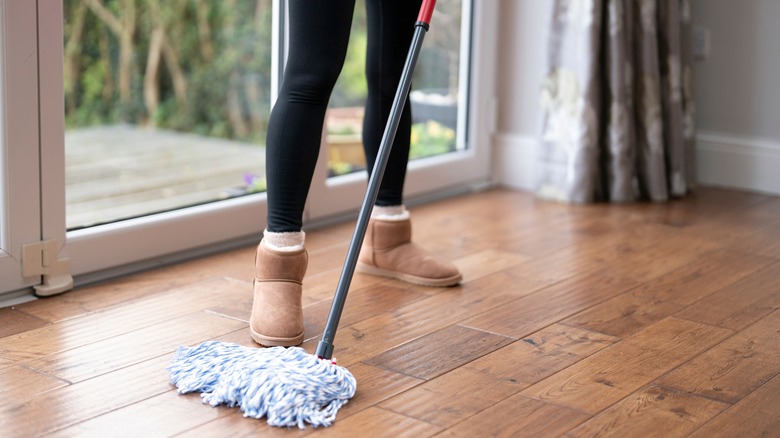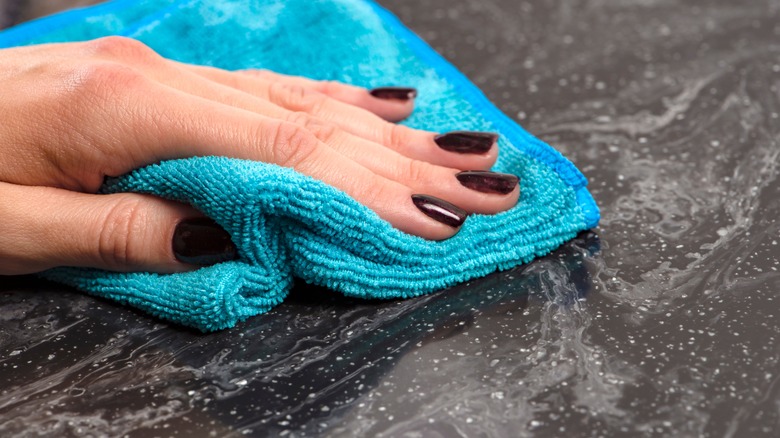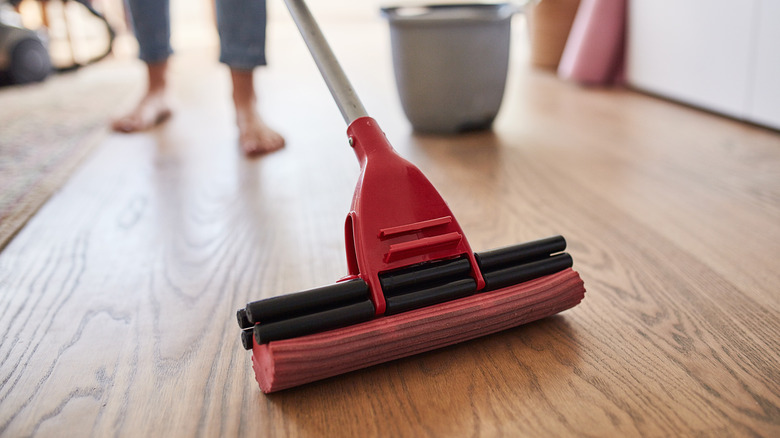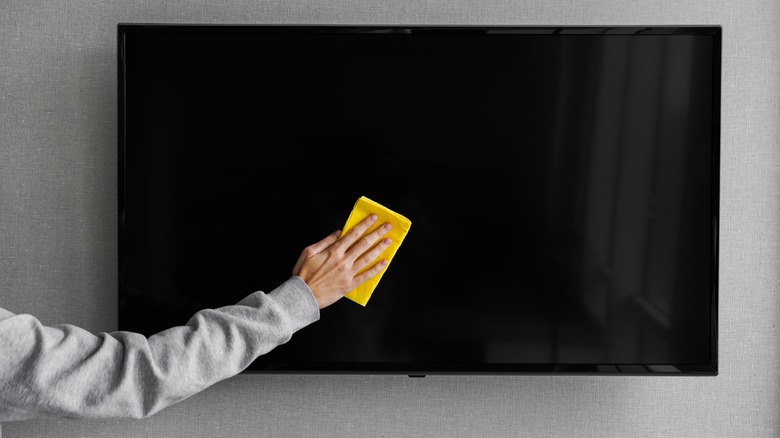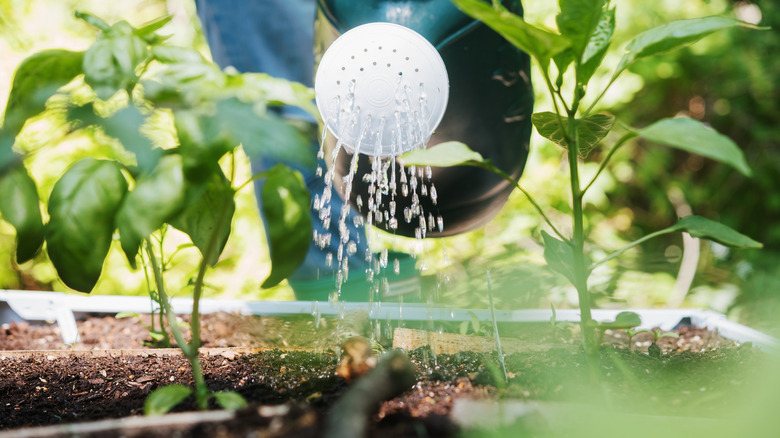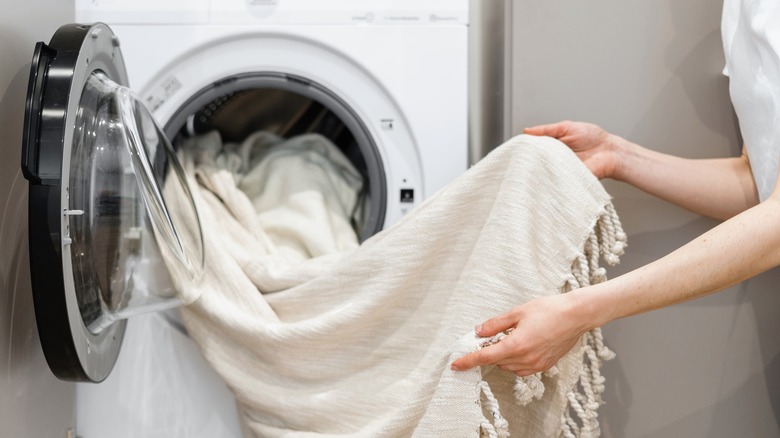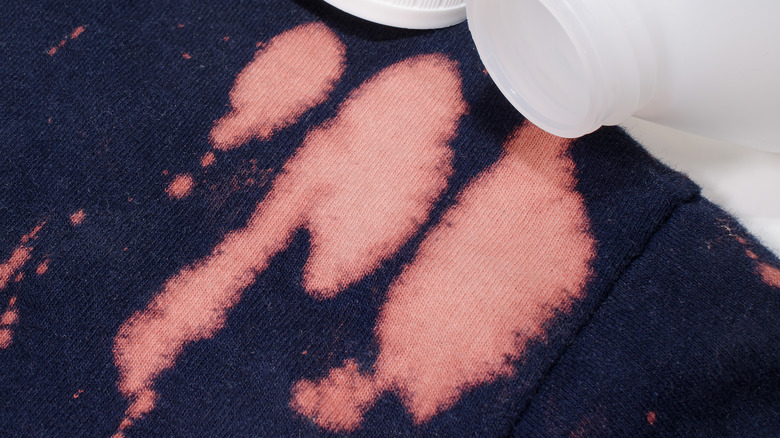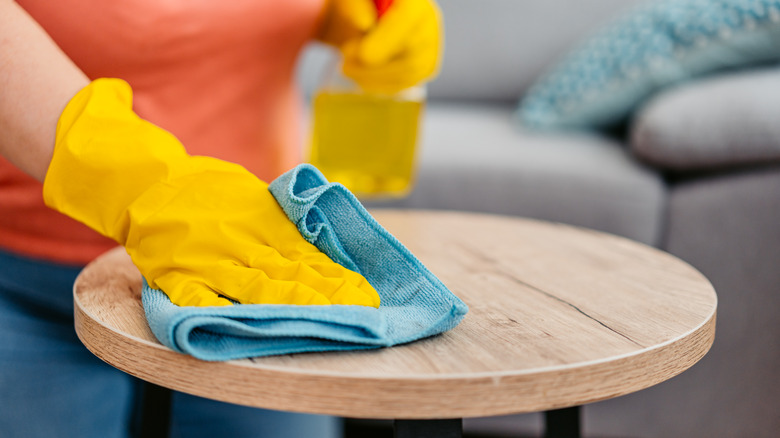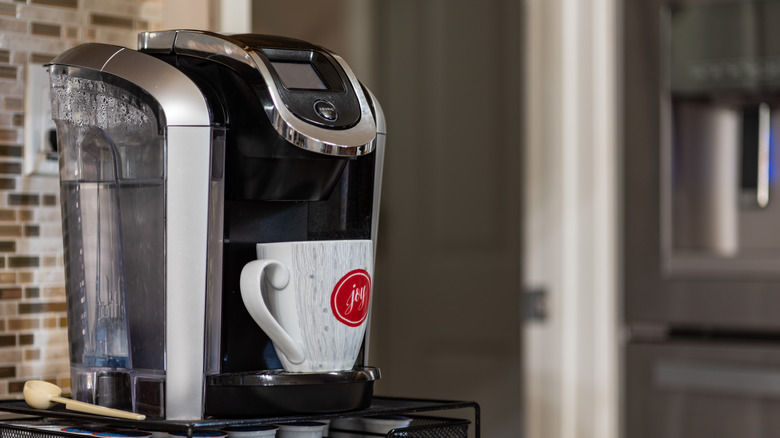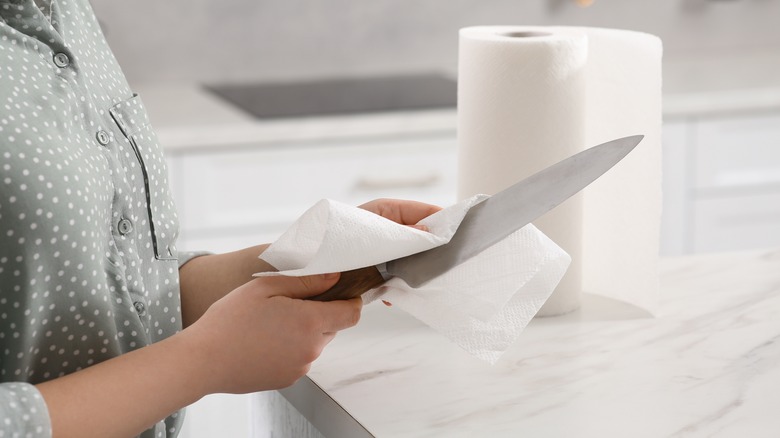Lemon Home And Garden Hacks You Should Avoid At All Costs
We may receive a commission on purchases made from links.
Fresh-smelling and eco-friendly, lemons are a common cleaning solution for those who want to avoid using harsh chemicals around their homes. From concocting all-purpose cleaners using lemon juice to using this kitchen ingredient to kill weeds, it may seem like there isn't anything the citrus fruit can't do. The high levels of citric acid are the key that aids this liquid in killing germs, making it a popular method for disinfecting several surfaces. However, because these tart fruits are so acidic, they aren't always the best option for everything in your home and garden.
Before you implement a viral lemon juice TikTok hack, you may want to double-check that you aren't causing more harm than good. In some cases, the juice simply isn't worth the squeeze, and in other cases, it leads to unintended damage. If you've done your research and are still unsure, it's always a good idea to test a small area first. To get you started on some lemon juice hacks to steer clear of, these are some of the most common ones to avoid.
Using lemon juice on natural stone can cause pitting
When you imagine the scent of a freshly cleaned kitchen, visions of lemons likely dance in your head. While there are many common areas around your kitchen you can deodorize with lemons, the acidic nature of this fruit isn't suitable for all surfaces. You can use lemon juice to get rid of tough countertop stains when made from certain materials, like laminate, but natural stones are prone to damage. Granite, marble, and other natural stones require a cleaner with a neutral pH. Otherwise, the high acidity can trigger a chemical reaction that results in etching, pitting, and staining. Lemons may be inexpensive, but repairing damage done to natural stone can be pretty costly.
To keep natural stone surfaces looking shiny and new, opt for cleaners specifically made for use on stone. For a more eco-friendly solution, combine ¼ cup rubbing alcohol and a few drops of dish soap with 1½ cups distilled water in a spray bottle. Give it a little shake to mix, spray the stained area, and wipe it up with a gentle microfiber cloth. However, soapy water is typically enough to tackle most spills. To further protect natural stone countertops, routinely seal them to ensure their durability. While sealer likely won't hold up against lemon juice, it'll keep them looking shiny and new with correct cleaning.
Cleaning hardwood floors with lemon juice can damage the seal
Although hardwood flooring is renowned for its durability and timeless appeal, there are a few limitations when it comes to choosing the right cleaners. Most wood floors are treated with a sealer, which acts as a barrier to shield the porous wood from stains, moisture, and everyday wear and tear. The protective seal not only helps maintain the floor's natural beauty, but also extends its lifespan. However, as cleaning book author Natalie Wise tells Today, "I don't recommend using vinegar or lemon juice, at least not in large quantities, as these can damage the floor's seal."
Rather than using these products that are high in acidity, choose a pH-neutral cleaner designed for wood surfaces. To avoid using harsh chemicals on your floors, you can add ¼ cup of mild dishwashing soap to a bucket of water. Another kitchen staple that will perfectly clean your hardwood floor is black tea, which contains polyphenolic compounds that can help kill germs that linger on the flooring's surface.
Wiping electronic screens with lemon juice can strip the protective layer
Dust and streaks may make it harder to view electronic screens, but using a lemon juice cleaner may only worsen the issue. Lemon juice can strip away the protective layers that manufacturers apply to screens. Acidic liquids degrade these coatings, leaving screens more susceptible to scratches and smudges. Even worse, the lemon juice could seep into the device, causing internal corrosion.
Often, all you'll need to remove dust and fingerprints from your phone, television, or laptop is a microfiber cloth. If you need a bit more oomph, spray a little distilled water on the cloth before wiping any screens. Because electronics can easily malfunction if wet, it's important to avoid spraying the screen directly. Use gentle, circular motions to work off any smudges and eliminate the dust, as excessive pressure can cause damage. And, gently clean your devices regularly to prevent buildup that can be tougher to remove later if it's ignored.
Making garden soil more acidic with lemon juice may harm your plants
Each plant in your garden has unique needs to keep it happy. Some species require alkaline soil, while others thrive in acidic. While lemon juice is commonly boasted as a natural way to increase acidity, this method can be harmful to plants if done incorrectly. Although small amounts of acidic ingredients like lemon juice can successfully alter the soil's pH without causing harm, it's easy to overdo it. When your soil's pH is too low, it can lead to plant burn, causing them to struggle to absorb nutrients. If you're not careful, it can stunt their growth and even kill them. Additionally, accidentally splashing lemon juice on the leaves is another way your plants can burn and die.
Before you attempt any hack to change your soil's pH, make sure you test it beforehand, so you know exactly what you're working with. For a more effective and controlled method, consider using soil amendments designed for this purpose, such as aluminum sulfate. This product will gently lower the soil's pH, allowing you to test it regularly until it's just right. Then, you can use a product like ammonium sulfate to maintain the pH, creating a stable acidic environment that will allow your acid-loving plants to thrive.
Using lemon juice on delicate clothing can weaken the fabric
You may have heard about the stain-fighting powers that lie within this common citrus fruit and may be tempted to use it to make some fabrics look brand new again. However, you want to avoid using TikTok's viral lemon hack on things like silk, lace, or pillows because the acid can erode the fibers of delicate materials. Highly acidic solutions can target the molecular structures in the fibers, weakening them and making them more susceptible to tearing and fraying.
If you want to lift stains out of a silky pajama set or finely woven lace curtains, there are methods that won't compromise their quality. Handwashing is the best method for delicate fabrics, as machines can be too harsh. For a gentle spot treatment, mix a little detergent and water. Add a layer of the mixture over the stain and gently press it into the fabric instead of brushing or scrubbing it. Then, thoroughly rinse the area and repeat the spot treatment as necessary before handwashing the item and allowing it to dry flat.
Lemon juice can cause bleaching on dark-colored fabrics
The bowl of lemons in your kitchen may tempt you to use the juice as a natural stain-fighting agent. There are several hacks that utilize the power of this tart juice, from throwing a cup into your washing machine to using it as a carpet cleaner. Although lemon juice can work as an effective stain remover on white materials, it could instead be the cause of staining on dark items. This sour fruit contains citric acid, which works as a bleaching agent. Rich Handel, a senior test project leader at Consumer Reports, explains, "Lemon juice is a mild bleaching agent, and the acidity may help remove the combination that traditional antiperspirants and sweat create on white T-shirts...It should not be used on anything that has colors."
Whether you want to eliminate a stain from your couch, floor, or article of clothing, steer clear of lemon juice unless it's already a white material. Instead, apply a layer of gentle dish soap over the stain. Add a tablespoon of baking soda over the soap to create a paste and massage it into the fabric. Let it sit and do its stain-fighting magic for about an hour, then rinse it thoroughly in the sink. Then, you can wash your clothes in your machine as usual.
Applying lemon juice to wooden furniture may damage the finish
Wood furniture adds warmth and charm to nearly any home, but it can be a challenging material to keep clean. Although you may love the fresh, lemony scent in many furniture polishes, this doesn't mean replacing it with lemon juice is the right move. In fact, the citric acid in lemon juice is too harsh for most wood surfaces. It can strip away protective finishes, dulling your beautiful pieces or even causing uneven spotting. Over time, the wooden furniture can become more vulnerable to scratching and discoloration.
Maintaining a regular dusting routine will prevent particles from building up while keeping your furniture looking as amazing as it was when you bought it. Use non-alkaline, soapy water to give your wood chair or table a deeper clean. Dip a soft cloth into the mixture and wring it out so it's damp rather than overly wet. Gently wipe the entirety of the surface, making sure to move in the direction of the grain. Once finished, always remove any excess moisture with a dry microfiber towel.
Lemon juice isn't the most effective way to descale your appliances
There's no doubt that lemon juice can effectively remove limescale in some instances. Citric fruits contain a chelating agent, which essentially grabs onto metal ions, preventing them from producing chemical reactions that can lead to tough deposits. Because of this, you can easily remove limescale on things like shower walls using lemon juice. Although there are some DIYers who swear by using kitchen staples like lemon juice or vinegar to descale their dishwasher or Keurig, this might only work for light buildup. However, if it's been months between cleaning, it likely isn't concentrated enough to tackle hard water deposits in your appliances.
While there are eco-friendly hacks for just about anything in your home and garden, it's probably a good idea to stick with the professional products for heavy buildup. Purchase descaling products for your specific appliances, such as this solution on Amazon, which will have the power it takes to remove buildup. Although attempts to eliminate the effects of hard water using lemon juice won't directly cause damage, its inefficacy could lead to lingering limescale deposits. These residues can gradually build up and cause your appliances to work improperly, or not at all, over time.
Cleaning knives with lemon juice can dull the blade
While it's a good idea to clean knives immediately rather than tossing them in the dishwasher, this acidic fruit juice isn't the best solution. While you might be tempted to soak your knife in that leftover lemon juice for a deep clean, the citric acid can cause erosion and dull the blade more quickly. Knife Steel Nerds conducted an experiment to determine how soaking blades in lemon juice affected sharpness. After allowing the knives to sit for several hours, they found that certain brands were noticeably duller and had corrosion present, and one developed an unwanted patina.
While you likely won't leave your blade in lemon juice for hours on end to clean it, you still might want to look for a gentler solution, especially for your most expensive knives. Plus, you likely don't want to sharpen your knives more often than you have to. Instead, all you need to clean your knives is a soft sponge soaked in mild dish soap and warm water. After gently washing the blade, thoroughly dry it with paper towels to keep rust at bay.
